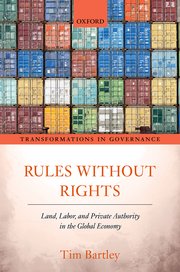The Rana Plaza factory collapse in Bangladesh, which killed more than 1,100 people, shunted global production networks into the spotlight. We saw the horrors of precarity, lax safety standards and weak representation. These are typical in factories the world over, not aberrations. Sexual harassment is also endemic. Why do these abuses persist? What’s the underlying political economy? Why is private regulation the widely accepted solution? And is it actually working? Alice Evans reviews Rules Without Rights: Land, Labor and Private Authority in the Global Economy, in which Professor Tim Bartley presents a comprehensive analysis of global governance, before setting out an inspirational new agenda.
Rules Without Rights: Land, Labor and Private Authority in the Global Economy. Tim Bartley. Oxford University Press. 2018.
Campaigners have long pushed for legally binding, transnational rules to prevent human rights violations and environmental damage in global supply chains. But they have struggled in vain. While trade agreements increasingly incorporate labour standards, they are rarely enforced. Even if workers in export-orientated industries highlight abuses, they are often repressed by manufacturers and governments reluctant to jeopardise business contracts. Buyers seek low costs to remain price competitive on our high streets. Manufacturers, retailers and governments thus perpetuate this system to retain jobs, commerce and economic growth – as Tim Bartley comprehensively details in Rules Without Rights: Land, Labor and Private Authority in the Global Economy.
With their calls for transnational legislation repeatedly rebuffed and rebuked, many campaigners have changed tack. They have targeted brands: naming and shaming poor practices, inflicting reputational damage, incentivising reforms. This focus on corporate social responsibility gained support from the Bill Clinton and Tony Blair governments, which championed voluntary, multi-stakeholder initiatives (such as the Forest Stewardship Council, the Fair Labor Association and the Ethical Trading Initiative).
As private regulation expanded, it gained supporters. The audit industry, eager to increase market share, purported to provide independent assurance of factory conditions. Brands and exporting country governments also embraced audits, inviting inspectors into factories and forests to placate campaigners, improve their reputations and retain conscientious consumers. Having garnered support from diverse stakeholders, privatised transnational governance became institutionalised. Many regard it as the only game in town, as Bartley articulates.
But does it work? Do codes of conduct actually improve conditions in global supply chains? Bartley uses two methodologies (qualitative and quantitative) to analyse two industries in two countries. He examines the historical trajectories and contemporary realities of logging and garment manufacturing in authoritarian China and democratic Indonesia, comparing certified and uncertified suppliers.
So, does certification make a difference?
Not really. With regards to wages, timely payments, verbal abuse and workers’ knowledge of labour laws, Bartley finds no differences between certified and uncertified Chinese garment factories after controlling for workers’ experience, education, hukou status, gender as well as factory size and ownership. Likewise, in Indonesia, abuses prevail across the board. 30 per cent of workers are in non-permanent roles in both certified and uncertified factories, even though this is expressly prohibited by Indonesian law. Furthermore, major grievances with management are just as common in certified and uncertified factories.
Why hasn’t certification improved outcomes?
Bartley identifies two key problems: buyers’ purchasing practices (racing to the bottom, then cutting loose); and repressive domestic governance (thwarting autonomous workers’ organisations). If manufacturers expect that buyers will reward higher safety standards with long-term, stable contracts, then they have greater incentive to invest and will make improvements, as Bartley shows.
 Image Credit: Garment Factory, Jiaxing, China (Matt CC BY 2.0)
Image Credit: Garment Factory, Jiaxing, China (Matt CC BY 2.0)
But long-term relationships are rare in global supply chains. Instead, we see rapid churning, re-selection and unstable orders. For example, Levi Strauss had 187 Chinese suppliers in 2005, but retained only nineteen of these in 2014. This is not unusual. Similarly, H&M would ‘dump the order in front of [several] suppliers and ask them for the price [..]. then choose the lowest price among them. In the middle of the year, they might renegotiate prices again,’ narrated a compliance consultant in Guangzhou, China. Cost competition is intense and unrelenting – not just between countries but also within them.
With no guaranteed business, there is little incentive for manufacturers to invest in reforms. Managers prefer to ‘sweat’ existing workers rather than recruit new staff. Illegal overtime remains pervasive, flouting codes of conduct. ‘When you go down to pricing and orders, it’s like CSR [Corporate Social Responsibility] never happened. They [brands] want this, they want that. But where’s the money?’ remarked one Chinese manager interviewed for this book.
Corporate codes of code purport to transcend the wider political economy: insulating islands of better work, notwithstanding civil society crackdowns and countervailing incentives. Yet, such claims are misleading, Bartley demonstrates. Although brands ostensibly support freedom of association, many source from authoritarian countries, quashing the autonomous labour movements that mobilise for better pay, conditions and rights. Current sourcing practices thus incentivise repression.
Enough of this pretence, insists Bartley. Buyers must become legally responsible for abuses in their supply chains. Extra-territorial liability would encourage more ‘patient sourcing’ (longer-term contracts) in low- and middle-income countries with autonomous labour movements, rewarding good practice.
Is this possible?
Yes! – exclaims Bartley, highlighting an inspirational example from forestry. Both the US and European Union prohibit the sale of illegally harvested timber. Interestingly, they do not impose external standards. Rather, they require compliance with domestic legislation in supplier countries. For example, a US court fined Lumber Liquidators thirteen million US dollars for selling wood that was logged in contravention of Russian law. Such transnationally binding penalties may incentivise wider due diligence and buttress the rising tide of ‘rights consciousness’ among export-orientated workers.
Is Bartley too utopian? Will private regulation persist? Or could governments adopt extra-territorial liability in other industries?
In my view, we have a major collective action problem, requiring a large-scale, coordinated change in beliefs and behaviour. If a national government proposed new legislation that increased costs, domestic companies would protest and threaten to relocate for fear of being undercut by foreign competitors (without such liabilities). Concerns regarding capital flight sap political support for new legislation. Further, if governments and campaigners do not see peers changing, they may not even consider reform. Instead they may follow the herd, despondently accepting existing arrangements. Self-interested concerns and norm perceptions thus curb unilateral deviation from the status quo of private regulation.
Indeed, although the UK’s Joint Select Committee Report on Business and Human Rights (2017) critiqued private regulation and called for binding legislation, this was rejected by Government. Instead we have the Modern Slavery Act (2015), which merely requires companies to upload a statement. Many have not done so, yet have not been penalised. However, major NGOs endorsed this weak legislation, presuming more radical action impossible.
But reforms are occurring on the continent. As of 2018, large French companies are legally required to identify and address risks to human rights, health, safety and the environment in their supply chains. This Duty of Vigilance Law was enabled by a confluence of factors: a history of state regulation; widespread scepticism of multinationals; a Socialist government; public horror of Rana Plaza; and social mobilisation coordinated by trade unions and non-governmental organisations.
By showcasing possibilities and shifting norm perceptions, the French Duty of Vigilance may embolden reformers in other countries. Indeed, Switzerland is now considering similar legislation mandating due diligence for environmental and human rights violations in global supply chains. Civil society campaigners are also pushing for this in Luxembourg. Likewise, in the EU, importers will need to prevent fuelling conflicts through mineral procurement.
The age of private regulation may be over. The time of extra-territorial liability is coming.
And not a moment too soon, as Rules without Rights persuasively demonstrates.
Alice Evans is a Lecturer in the Social Science of Development at King’s College London. She researches inequality, social change and global production networks. Read more by Alice Evans.
Note: This review gives the views of the author, and not the position of the LSE Review of Books blog, or of the London School of Economics.


 Find this book:
Find this book: 





1 Comments